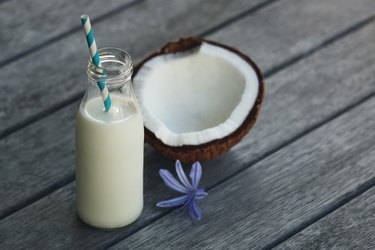
If you need a non-dairy alternative to milk for baking, then you can substitute coconut for milk in your recipes as long as the coconut flavor won't interfere. The key is to pay attention to the type of milk or cream the original recipe calls for.
Tip
To bake with coconut milk, replace it 1:1 for milk in the recipe. It doesn't work well for all recipes because of the coconut flavor.
Video of the Day
Coconut Milk vs. Coconut Cream
Before you start baking, make sure you understand the difference between coconut milk and coconut cream. According to Bon Appetit, they are both made with coconut and water. The difference lies in how much water and coconut is in each. Coconut cream contains more coconut and less water, so it is thicker and higher in fat than coconut milk.
Video of the Day
Which one you use and when comes down to a matter of personal preference and how thick you need the liquid to be. For example, coconut cream is better for Thai curries that you want to be a bit thicker than a standard soup.
Nutritionally speaking, according to the USDA, canned coconut milk contains 445 calories per cup, with 4.6 grams of protein, 48 grams of fat and 6 grams of carbohydrates. Canned coconut cream, according to the USDA, contains 1,551 calories per cup, with 12 grams of protein, 157 grams of fat and 49 grams of carbohydrates.
Commercially prepared coconut milk, such as Silk Unsweetened Coconut Milk, is made with a greater amount of water and less coconut. One cup contains 40 calories, 0 grams of protein, 4 grams of fat and 1 gram of carbohydrates. For the majority of recipes, you can substitute coconut milk for milk with this type.
Read more: Coconut Milk vs. Coconut Oil
Coconut Milk for Milk Replacement
According to the Asthma and Allergy Foundation of America, when it comes to using coconut milk for milk replacement, there are no difficult conversions to worry with. You can use it cup for cup just like you would with regular milk.
If a recipe calls for whole milk, use full-fat canned coconut milk. If a recipe calls for heavy cream, you can use canned coconut cream or full-fat canned coconut milk for that extra boost of fat that heavy cream offers compared to cow's milk-based heavy cream.
If a recipe calls for lower-fat milk, you can use a light version of coconut milk. Many brands of canned coconut milk offer a light version that contains less fat. If a particular recipe calls for skim milk, it would not be good to substitute coconut milk for milk in that recipe because you cannot have fat-free coconut milk due to the fact that it is naturally so high in fat.
Coconut milk is not the ideal milk replacement for all recipes because of the coconut flavor it adds to the final meal. However, you can also use coconut milk or coconut milk-based coffee creamer 1:1 in place of evaporated milk, so long as the coconut flavor won't impede the recipe.
Read more: 5 Health Benefits of Coconut Milk
Coconut Milk in Cake Mix
You can use coconut milk in cake mix the same way you'd use regular milk. The resulting cake will have a light coconut flavor, though. So, if you're making a cake with a flavor that would clash with the coconut, it is not a good idea to substitute coconut milk for milk in that recipe or with that mix. If you're making a coconut cake, however, using coconut milk in cake mix is a great way to put an extra bit of coconut flavor in the recipe without having to rely on an extract.
Remember if you opt to use a sweetened coconut milk, such as Silk Original Coconut Milk, it will contain added sugar. In the case of Silk, there are 5 grams of sugar, all of which are added, per cup. This may mean you need to adjust the sugar in the recipe accordingly. Failure to do so may cause the cake to be too sweet.
- Bon Appetit: "What is Coconut Cream Anyway?"
- U.S. Department of Agriculture Nutrient Database: "Nuts, Coconut Milk, Canned"
- U.S. Department of Agriculture Nutrient Database: "Nuts, Coconut Meat, Dried (Desiccated), Creamed"
- Silk: "Unsweetened Coconut Milk"
- Asthma and Allergy Foundation of America: "Cooking and Baking without Milk Ingredients"
- Silk: "Original Coconut Milk"